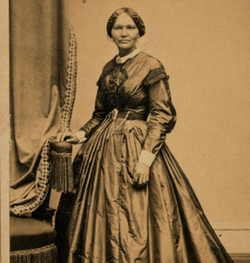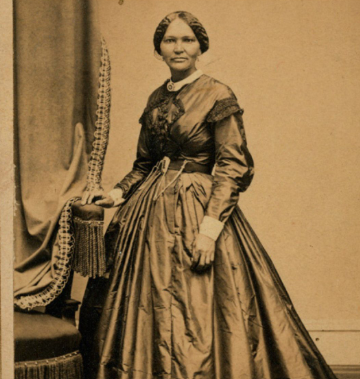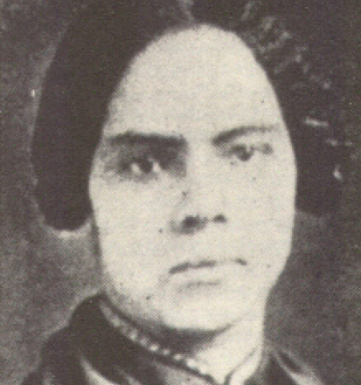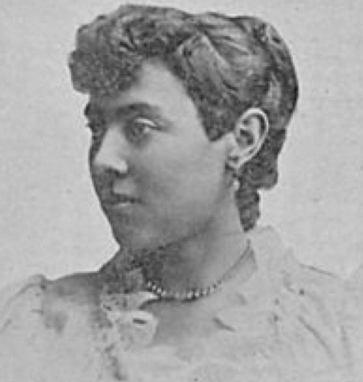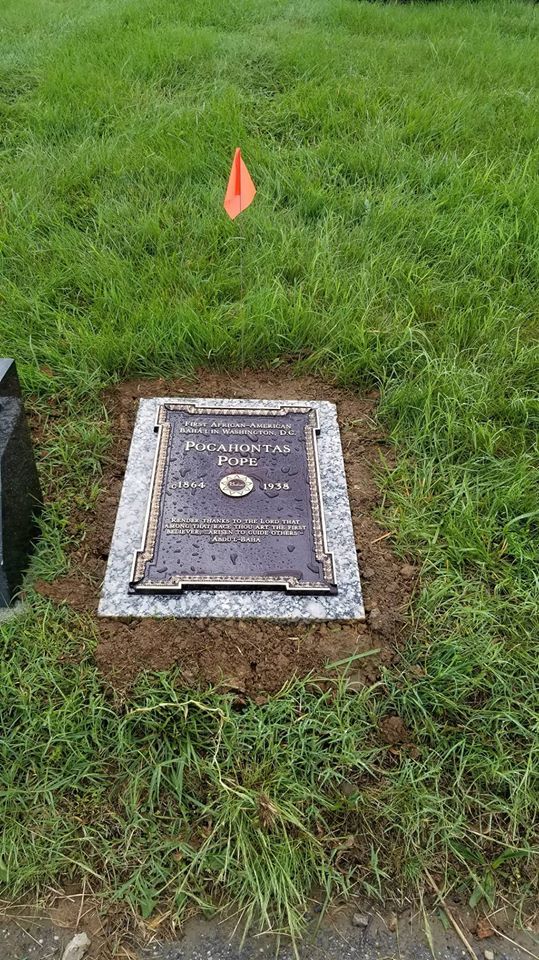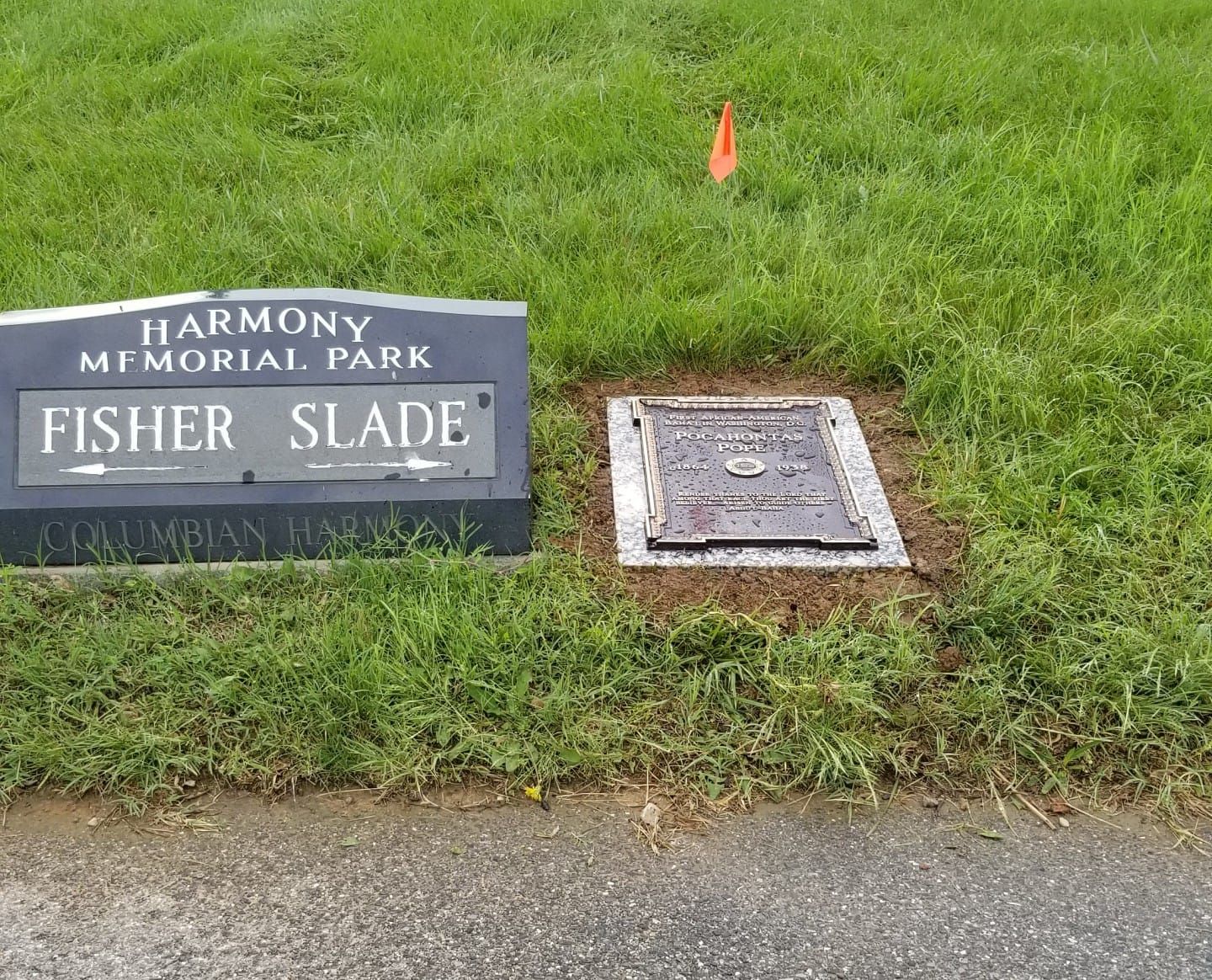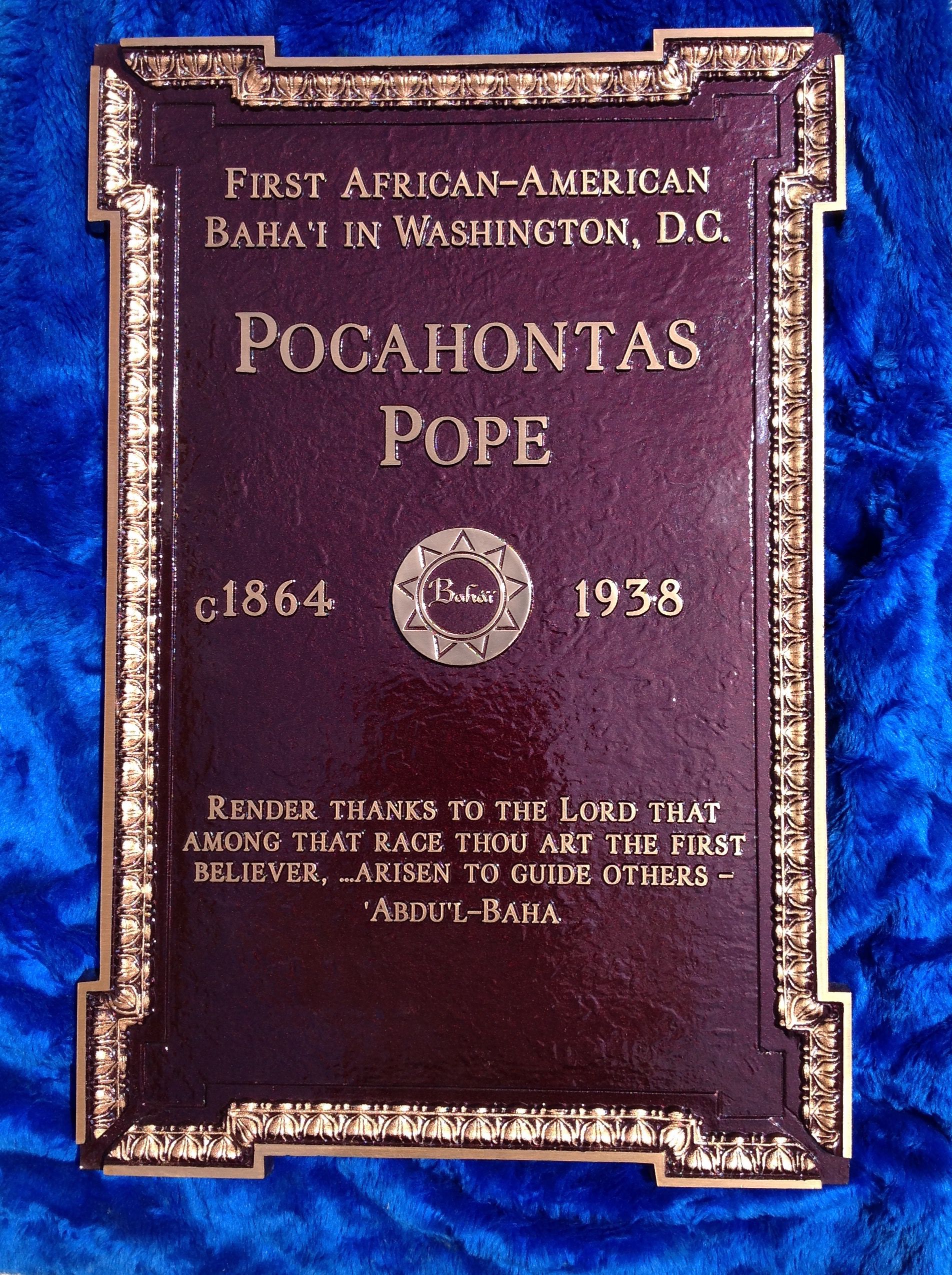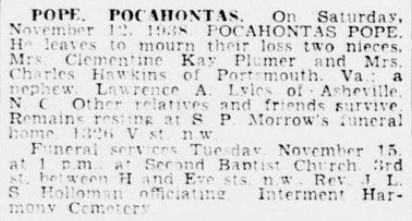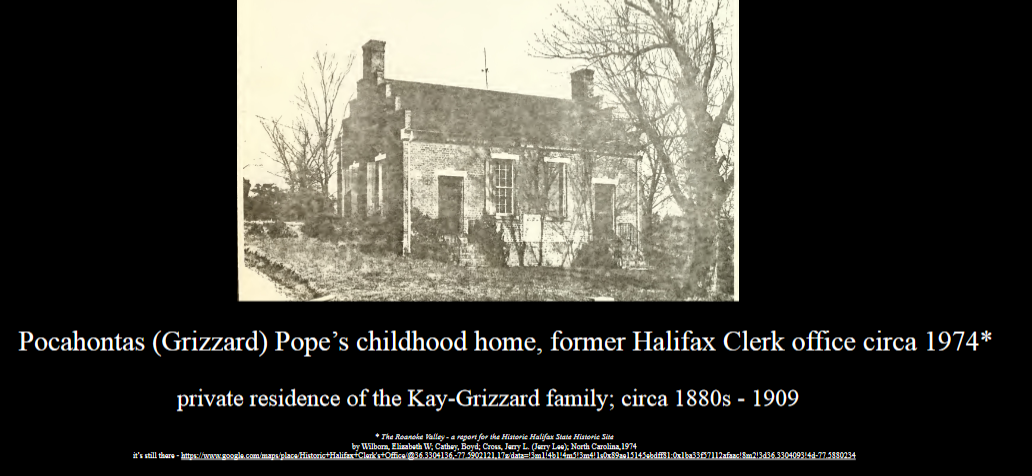Pocahontas Pope was born to Mary Cha and John Kay in Halifax county North Carolina about 1864. As a child she lived in Halifax County, North Carolina. She married John W. Pope in 1883 in Halifax. They lived in Plymouth, North Carolina and later moved to Washington, DC where they would spend the rest of their lives. Pocahontas Pope became a member of the Baha'i Faith in 1906.
Brothers and sisters:
Walter Cha Kay
Willey (Billy) Cha Kay
Roxanor Cha kay
Alexander Cha Kay
Step-brothers and sisters:
Lindbel Grizzard
Casy Grizzard
Lessia Grizzard
Ellick Grizzard
Mary Grizzard∼African-American Faith Leader. Pocahontas Pope was a religious personage of note in Halifax County, NC and Washington, DC, becoming the first African-American to become a member of the Bahá'í Faith in that city. Her parents, Mary Sanlin (Sanderlin) and John Kay, were both from families of free citizens of African descent in North Carolina. The Kay and related family names are also known among the Haliwa-Saponi indigenous people in the northeast Piedmont area of North Carolina. Pocahontas married John W. Pope in 1883 in Halifax. They lived in Plymouth, North Carolina and later moved to Washington, DC where they would spend the rest of their lives. Pocahontas Pope became a member of the Baha'i Faith in 1906. She is already known through a letter 'Abdu'l-Bahá wrote to her, comparing people of African descent to the "pupil of the eye," which, though dark in color, is the "source of light.". Pocahontas' father died while Pocahontas was young. In 1876, her mother married Lundy Grizzard, another free citizen of African descent who owned important local properties. Grizzard became stepfather to Pocahontas, who then took the Grizzard family name. Grizzard was known in local and regional politics on the "Radical" (that is, Republican) ticket. Her husband, John W. Pope (1857–1918), born and raised in Rich Square, North Carolina, was the grandson of Jonas Elias Pope (1827–1913), a Quaker and carpenter who owned a significant amount of land. She was listed as "White" on her marriage certificate, while later census records variously categorized her as "Mulatto" or "Negro," reflecting problems of racial categorization. Pope was a teacher and principal at the Rich Square (North Carolina) Academy, a manager of activities at the local African Methodist Episcopal (AME) Church as "Reverend", a visible community leader, writing newspaper columns, instructing local teachers, giving at least one Emancipation Day speech to a crowd of thousands, and attending Republican state conventions, and was elected a commissioner for Rich Square. She is reported during this same period to have played the organ, assisted in managing the Rich Square Academy, given talks to a range of civic audiences, and managed various activities for the AME Church. In 1898, the Popes hosted North Carolina Representative George H. White, the last, and during his tenure, the only African American to serve in Congress during the beginning of the Jim Crow era. Statewide politics and society became more dangerous for citizens of African descent in 1898 as North Carolina began the process of enforcing racial segregation and Jim Crow laws. In the latter part of 1898, the Popes were recorded as having relocated to Washington, D.C. She participated in the academic discussions of the day in Washington. She was on committees meeting with the school board to introduce Black history in the curriculum. She was among those who responded to criticism of the progress of Americans of African descent. She and her husband were officers of the Baptist Lyceum, at which she spoke on race relations. The Baptist Lyceum was an activity of the Second Baptist Church, one of the oldest African American congregations in Washington, D.C. Pocahontas Pope herself was described in a 1903 issue of The Colored American as "intensely religious." Both Pocahontas and her husband were involved with appeals to President Theodore Roosevelt, urging him to find a position for ex-Congressman White. Pope worked at the Census Bureau but in winter 1901–02, Census Bureau Superintendent William Rush Merriam (1849–1931) fired him, along with other "Negro clerks." In 1906, Pocahontas Pope became a Bahá'í—the first African-American in the District to do so. In addition to her education, advocacy, and community service, she was also an accomplished seamstress, one of the few money-earning avenues open to African American women at the time. Among those to whom she provided professional services were Bahá'ís Pauline Knobloch Hannen, her sister Alma Knobloch, and their mother Alma. Pauline resolved to share the Bahá'í message with people of African descent. Pauline was the one who first shared the Bahá'í message with Pocahontas Pope. 'Abdu'l-Bahá (1844–1921), the son of Bahá'u'lláh, was the head of the Bahá'í community at that time. Pocahontas wrote her declaration of faith to 'Abdu'l-Bahá and received a response that said in part: "Render thanks to the Lord that among that race thou art the first believer, that thou hast engaged in spreading sweet-scented breezes, and hast arisen to guide others. . . . Although the pupil of the eye is black, it is the source of light. Thou shalt likewise be." By July 1908, fifteen African Americans had embraced the faith in Washington, D.C. Together with their European American and Persian American fellow believers, they formed the first interracial community in Bahá'í history among believers of these diverse backgrounds. Hannen recorded that well-known Bahá'ís such as Lua Getsinger spoke at the Pope home at 12 N St. NW. At these meetings twenty to forty people, mostly of color, would be in attendance. Included among the Popes' circle were prominent African Americans who later became Bahá'ís, including Coralie Franklin Cook (1861–1942, Howard University educator and foremost African American suffragist); Harriet Gibbs Marshall (1868–1941, founder of the Washington Conservatory of Music, who introduced African American music to the D.C. public education system; and Alain LeRoy Locke (1885–1954, philosopher, writer, and educator, known as the father of the Harlem Renaissance, who Dr. Martin Luther King, Jr., compared to Aristotle and Plato). After she became a Bahá'í, her husband supported Bahá'í events at their home while they continued their other work in the city. Her husband died in March 1918. There is very little currently known about her final two decades. She died at Saint Elizabeth's Hospital in Washington, D.C., due to illness. She was originally buried in the Columbian Harmony Cemetery and then moved to the National Harmony Memorial Park, where the exact location of her grave is not clear. Bahá'ís installed a memorial for her at the corner of the Slade Section in National Harmony.
Pocahontas Pope was born to Mary Cha and John Kay in Halifax county North Carolina about 1864. As a child she lived in Halifax County, North Carolina. She married John W. Pope in 1883 in Halifax. They lived in Plymouth, North Carolina and later moved to Washington, DC where they would spend the rest of their lives. Pocahontas Pope became a member of the Baha'i Faith in 1906.
Brothers and sisters:
Walter Cha Kay
Willey (Billy) Cha Kay
Roxanor Cha kay
Alexander Cha Kay
Step-brothers and sisters:
Lindbel Grizzard
Casy Grizzard
Lessia Grizzard
Ellick Grizzard
Mary Grizzard∼African-American Faith Leader. Pocahontas Pope was a religious personage of note in Halifax County, NC and Washington, DC, becoming the first African-American to become a member of the Bahá'í Faith in that city. Her parents, Mary Sanlin (Sanderlin) and John Kay, were both from families of free citizens of African descent in North Carolina. The Kay and related family names are also known among the Haliwa-Saponi indigenous people in the northeast Piedmont area of North Carolina. Pocahontas married John W. Pope in 1883 in Halifax. They lived in Plymouth, North Carolina and later moved to Washington, DC where they would spend the rest of their lives. Pocahontas Pope became a member of the Baha'i Faith in 1906. She is already known through a letter 'Abdu'l-Bahá wrote to her, comparing people of African descent to the "pupil of the eye," which, though dark in color, is the "source of light.". Pocahontas' father died while Pocahontas was young. In 1876, her mother married Lundy Grizzard, another free citizen of African descent who owned important local properties. Grizzard became stepfather to Pocahontas, who then took the Grizzard family name. Grizzard was known in local and regional politics on the "Radical" (that is, Republican) ticket. Her husband, John W. Pope (1857–1918), born and raised in Rich Square, North Carolina, was the grandson of Jonas Elias Pope (1827–1913), a Quaker and carpenter who owned a significant amount of land. She was listed as "White" on her marriage certificate, while later census records variously categorized her as "Mulatto" or "Negro," reflecting problems of racial categorization. Pope was a teacher and principal at the Rich Square (North Carolina) Academy, a manager of activities at the local African Methodist Episcopal (AME) Church as "Reverend", a visible community leader, writing newspaper columns, instructing local teachers, giving at least one Emancipation Day speech to a crowd of thousands, and attending Republican state conventions, and was elected a commissioner for Rich Square. She is reported during this same period to have played the organ, assisted in managing the Rich Square Academy, given talks to a range of civic audiences, and managed various activities for the AME Church. In 1898, the Popes hosted North Carolina Representative George H. White, the last, and during his tenure, the only African American to serve in Congress during the beginning of the Jim Crow era. Statewide politics and society became more dangerous for citizens of African descent in 1898 as North Carolina began the process of enforcing racial segregation and Jim Crow laws. In the latter part of 1898, the Popes were recorded as having relocated to Washington, D.C. She participated in the academic discussions of the day in Washington. She was on committees meeting with the school board to introduce Black history in the curriculum. She was among those who responded to criticism of the progress of Americans of African descent. She and her husband were officers of the Baptist Lyceum, at which she spoke on race relations. The Baptist Lyceum was an activity of the Second Baptist Church, one of the oldest African American congregations in Washington, D.C. Pocahontas Pope herself was described in a 1903 issue of The Colored American as "intensely religious." Both Pocahontas and her husband were involved with appeals to President Theodore Roosevelt, urging him to find a position for ex-Congressman White. Pope worked at the Census Bureau but in winter 1901–02, Census Bureau Superintendent William Rush Merriam (1849–1931) fired him, along with other "Negro clerks." In 1906, Pocahontas Pope became a Bahá'í—the first African-American in the District to do so. In addition to her education, advocacy, and community service, she was also an accomplished seamstress, one of the few money-earning avenues open to African American women at the time. Among those to whom she provided professional services were Bahá'ís Pauline Knobloch Hannen, her sister Alma Knobloch, and their mother Alma. Pauline resolved to share the Bahá'í message with people of African descent. Pauline was the one who first shared the Bahá'í message with Pocahontas Pope. 'Abdu'l-Bahá (1844–1921), the son of Bahá'u'lláh, was the head of the Bahá'í community at that time. Pocahontas wrote her declaration of faith to 'Abdu'l-Bahá and received a response that said in part: "Render thanks to the Lord that among that race thou art the first believer, that thou hast engaged in spreading sweet-scented breezes, and hast arisen to guide others. . . . Although the pupil of the eye is black, it is the source of light. Thou shalt likewise be." By July 1908, fifteen African Americans had embraced the faith in Washington, D.C. Together with their European American and Persian American fellow believers, they formed the first interracial community in Bahá'í history among believers of these diverse backgrounds. Hannen recorded that well-known Bahá'ís such as Lua Getsinger spoke at the Pope home at 12 N St. NW. At these meetings twenty to forty people, mostly of color, would be in attendance. Included among the Popes' circle were prominent African Americans who later became Bahá'ís, including Coralie Franklin Cook (1861–1942, Howard University educator and foremost African American suffragist); Harriet Gibbs Marshall (1868–1941, founder of the Washington Conservatory of Music, who introduced African American music to the D.C. public education system; and Alain LeRoy Locke (1885–1954, philosopher, writer, and educator, known as the father of the Harlem Renaissance, who Dr. Martin Luther King, Jr., compared to Aristotle and Plato). After she became a Bahá'í, her husband supported Bahá'í events at their home while they continued their other work in the city. Her husband died in March 1918. There is very little currently known about her final two decades. She died at Saint Elizabeth's Hospital in Washington, D.C., due to illness. She was originally buried in the Columbian Harmony Cemetery and then moved to the National Harmony Memorial Park, where the exact location of her grave is not clear. Bahá'ís installed a memorial for her at the corner of the Slade Section in National Harmony.
Inscription
First African American Baha'i in Washington, D.C.
Pocahontas Pope
c1864 - 1938
Render thanks to the Lord that among that race thou art the first believer... arisen to guide others. - 'Abdu'l-Baha
Gravesite Details
Her original grave marker, if there was one, was removed and unceremoniously used as fill along the Potomac River. Her gravestone is being sought among the many dumped along the Potomac shoreline.
See more Pope or Kay (Grizzard) memorials in:
- National Harmony Memorial Park Cemetery Pope or Kay (Grizzard)
- Hyattsville Pope or Kay (Grizzard)
- Prince George's County Pope or Kay (Grizzard)
- Maryland Pope or Kay (Grizzard)
- USA Pope or Kay (Grizzard)
- Find a Grave Pope or Kay (Grizzard)
